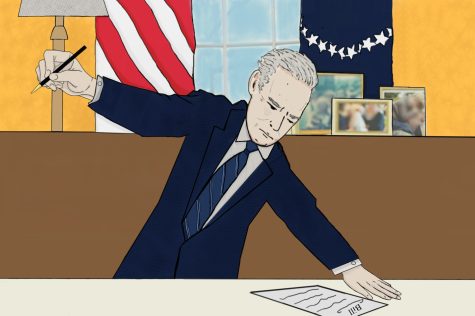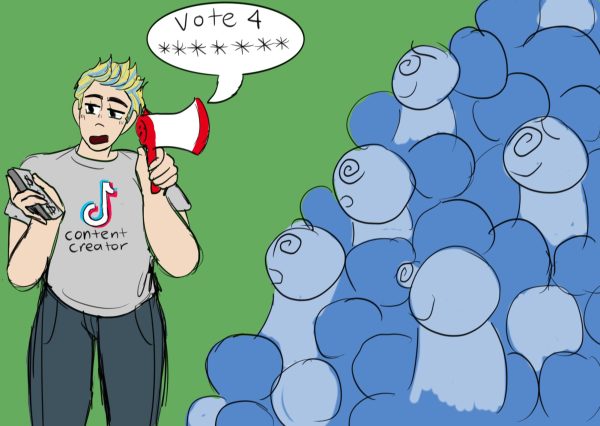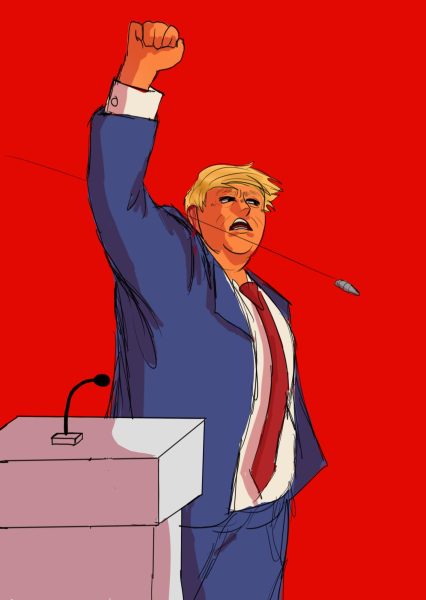Joe Biden passes Inflation Reduction Act

(Sofia Murillo)
46th President of the United States, Joseph Biden signs the Inflation Reduction Act into law on Aug. 15 at the White House. While some believe this law to be beneficial, others feel it won’t be effective for our economy.
According to a statement from the White House, “the Inflation Reduction Act lowers prescription drug costs, health care costs, and energy costs.” This will benefit American workers and “create good-paying, union jobs across the country”. Furthermore, the statement states that the act will “lower the deficit and ask the ultra-wealthy and corporations to pay their fair share. And no one making under $400,000 per year will pay a penny more in taxes.”
Biden and Senate Majority Leader Charles Shumer began the process of fulfilling the Inflation Reduction Act and has been working on it for months. The beginning of August was when the bill reached the final stages of implementation—Aug. 5 was when the U.S. House of Representatives passed the Inflation Reduction Act.
The Congressional Budget Office estimates that the bill has a small contrast in rates of inflation over the next couple of years. Meaning that through time, inflation will only have a slight discrepancy from before the bill was implemented. Even though it does impact and take action on lowering costs, it doesn’t substantially show effects on the economy. Both economists that positively and negatively view the bill agree upon its effects starting in the following years.
Not only will the bill take years to show the benefits, but according to the article, What the Inflation Reduction Act will and won’t accomplish by the Washington Post, “the reduction to the deficit, whether the $300 billion over the next decade its drafters promise or the just over $102 billion the CBO expects, adds up to little in the grand scheme of trillions in national debt.”
When running for president, Biden assured that the Inflation Reduction Act incorporates strong labor protections to federal tax credits. According to the statement made by the White House, the bill introduces good-paying union jobs that contribute to helping reduce emissions in all sectors of the U.S. economy. By reducing emissions, it takes action on climate change which Biden made sure to include in the bill.
Furthermore, the bill makes the tax code more equitable by making sure large corporations and wealthy people pay their equal share of taxes. In addition, the White House’s statement states that the act will crack down on the largest profitable corporations that currently get away with paying little to no federal income tax, instituting a minimum corporate tax of 15%.”
As large corporations have to pay a larger percentage in corporate taxes, the bill is helping with advancement towards fixing the tax code to be more impartial. Along with the benefits of equal share of tax payments, the Inflation Reduction Act is also striving to minimize the cost of healthcare and prescription drug costs for U.S. families.
The White House states, “the Inflation Reduction Act will protect Medicare recipients from catastrophic drug costs by phasing in a cap for out-of-pocket costs and establishing a $35 cap for a month’s supply of insulin. As an historic win, Medicare will be able to negotiate prices for high-cost drugs for the first time ever.”
This bill holds high importance to U.S. families because those who can’t afford high cost drugs, Medicare is now able talk about lowering the cost. According to USN, by lowering prescription drug costs, people are saving more money especially for the elderly, while also “extending health insurance subsidies and reducing energy prices.” Even though the new law won’t show much difference the next couple of years, by reducing the government’s budget deficit, it “might slightly lower inflation by the end of this decade.’’
Although the bill helps fix the current situation of health care, prescription drug costs, climate change and taxes, according to the Washington Post it “still isn’t satisfactory.”
The Inflation Reduction Act won’t necessarily reduce inflation altogether, but it will have an impact on helping U.S. families with prescription drug costs, health care, taxes and climate change. According to USN, “Biden himself, in speaking of the legislation’s effect on inflation, has referred to potentially lower prices in individual categories rather than to lower inflation as a whole.”

Hello! I am a senior at BVH, and I have been on the Crusader staff for all four years now. This year I am Co Editor-in-Chief and was previously the Editor-at-Large,...

I am a senior this 2022-2023 school year at Bonita Vista High and a first year Features Editor for the Crusader. Although I have always loved writing,...




